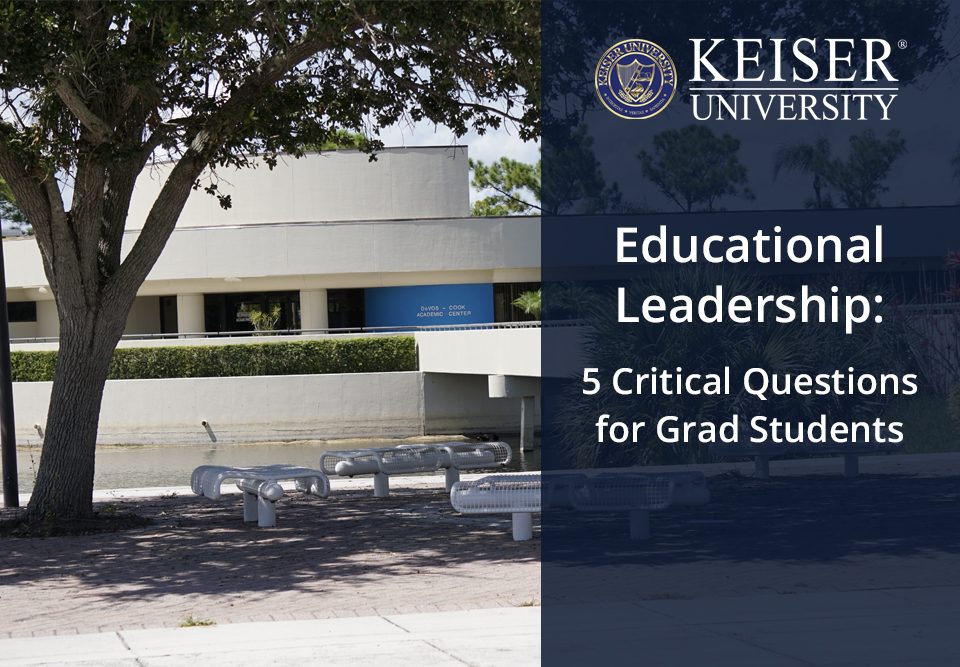From the superintendent down to the individual classroom teacher, the world of education is full of strong leaders. Educational leadership is a graduate training program that develops these leaders and makes them more effective at what they do. Yet educational leaders are needed in other industries as well. Keiser University recently sat down with Dr. Stephanie VanDeventer, the chair of graduate programs in education, and Dr. Jessica Fuda Daddio, one of the school’s academic advisors in educational leadership, to discuss this degree program and its implications – both in education and for the rest of the community. Here are some insights from that discussion.
1. What Is Educational Leadership?
When asked to define educational leadership, Dr. VanDeventer said, “We view educational leadership as that overarching well of knowledge that helps a person to operate in either a teaching or administration capacity – or even business if they want to start something new.” She indicated that this degree could lead to everything from being a better K-12 teacher or administrator to starting an education-related business or leading outside of the realm of education.
An educational leadership degree focuses on the theories of education and leadership. Students learn how to communicate and collaborate, apply knowledge and make a positive difference, whether within education or the community. Problem-solving is also a key component of this degree. In this way, it not only provides a foundation for school leaders but also provides important instruction that can benefit other industries.
2. What Can I Do with a Degree in Educational Leadership?
Dr. VanDeventer and Dr. Fuda Daddio agree that a degree in educational leadership has applications beyond just classroom teaching. In fact, Dr. Fuda Daddio indicates that people from many industries outside of education choose to pursue this degree to make a difference in their sector. She said, “We have a lot of nursing students that come into education to try to make a difference in their field from an instructional standpoint, as well as business people who already have some business knowledge and want to make changes in education. So now they can combine the best of both worlds to make that happen.”
Some of the places where you could find work after earning this degree include:
Assistant Principal
Working in administration is a common goal of people who pursue an educational leadership graduate degree. Assistant principals work a bit more behind the scenes, overseeing staff and ensuring the administrative work gets done well.
Principal
The principal is the head of a school and provides oversight for the daily operations. They are the main decision maker, directing major decisions and coordinating with the school board and community to ensure students receive a quality education.
Superintendent
While a principal provides leadership within an individual school, a superintendent provides similar supervision for the entire district or a group of public schools within the district. Principals report to the superintendent, who is often responsible for district-wide decisions, such as curriculum choices and dress code policies.
Administrator
An administrator is similar in role to a principal or assistant principal. Often this title is given to a leader who oversees one part of a school or district. For example, if an institution is large enough to have multiple smaller schools inside, the administrator may lead just the drama and art department or the STEM department.
Professor
According to Dr. VanDeventer, many students pursue educational leadership because they want to work as college professors or teach in a graduate school setting. Working in higher education demands understanding leadership, which is why educational leadership is a good starting point. These future professors may already have the subject matter expertise they need with another degree or lived experience, but they need leadership and education training to move into this role.
Entrepreneurship in Education
Both Dr. VanDeventer and Dr. Fuda Daddio indicated that many of the graduates of Keiser’s educational leadership programs had the desire to start their own schools. Dr. VanDeventer commented on one student who wanted to build a church-run school, and he used his educational leadership training to do so effectively. She then spoke about a few other students who took their training to Africa to improve the quality of education by starting schools in the villages where they grew up.
Community Education
Dr. VanDeventer discussed one student who worked with individuals after they got out of prison. “This woman wanted to design instruction for students leaving an incarceration situation and help them break the cycle of recidivism. She wanted the credential in education leadership to start an educational program to serve that population.”
Nonprofit Work
Nonprofit organizations lacking strong leadership struggle. Not only do their staff members struggle, but the people they serve do as well. In addition, the public tends to be skeptical and untrustworthy of nonprofit groups with poor leadership. Thus, the nonprofit sector has a significant need for quality educators, and some educational leadership graduates are filling these roles. From educating the volunteers within the nonprofit organization to creating training for the people using a nonprofit’s services, strong leaders who understand education are helpful in this field.
HR Training
Today’s human resources professionals rely heavily on instruction to help their employees understand everything from using an organization’s tech tools to acting in compliance with company policy. The instructional and curriculum design and leadership components of an educational leadership degree can help in this setting. Human resources professionals can gain the skills necessary to plan training programs with this degree.
Continuing Education
Continuing education is necessary for most fields, as certifications require professionals to continue growing their skills. A degree in educational leadership includes a curriculum design component that can provide students with the skills to develop and implement continuing education programs in their own industries. Professionals with this degree can step into roles such as directors of continuing education or professional development coordinator.
Online Education
As online education continues to grow in the post-COVID world, the need for educational leaders grows as well. This is one field where people with a master’s degree are going to be in high demand because of their knowledge of how to develop and implement instructional experiences across platforms.
3. Do I Have to Be in Education to Become an Educational Leader? No!
A unique benefit of an educational leadership degree is that it fits into many different fields. Any field that trains and grows its employees can benefit from trained educators. Graduates of Keiser’s program can often be seen working in:
- Corporate roles
- Nursing
- Human resources
- Government roles
- Religious organizations
- And more!
This is a versatile degree that can benefit most industries, which is part of what makes it so popular.
4. Which Degree Should I Get in Educational Leadership?
There are multiple degree options for individuals pursuing an educational leadership program, and the right one for you will depend on what education you already have and what your career goals are. The degree options include:
- Master of Science in Educational Leadership:
This degree is ideal for those with an undergraduate degree in education or another field who want to add an educational leadership component to their repertoire. Teachers interested in superintendent or principal roles often use this degree as a jumping-off point, according to Dr. VanDeventer. It also works well for people who wish to transition into educational roles from a different industry. - Education Specialist in Educational Leadership:
The EdS degree is a level between a master’s degree and a doctoral program. It provides a deeper look into educational leadership but is not research-driven. Students who already have a master’s degree can use this to add educational leadership training without the need to get involved in a research project. - Doctor of Philosophy in Educational Leadership:
The PhD is the terminal degree possible for educational leadership. It is highly research-based and prepares students for very high levels of leadership within the education field. Students in this program will be at the forefront of research in educational leadership as the world of teaching continues to evolve.
5. Why Is Good Educational Leadership Important?
Having leaders trained in educational leadership in both education and other fields is vital to the success of the community as a whole. According to Dr. Fuda Daddio, “Without quality education leaders, we would fail horribly. By going through our program, our hope is that we can develop effective change through the people that lead, especially in education where we are making huge impacts on our society.”
Training in educational leadership is important to people because of the skills it provides. These include:
Communication
A strong focus of educational leadership programs is communication, both with students and other people in an organization. Written communication and oral communication are both integral parts of these programs. Effective communication skills are vital to success in most industries.
Flexibility and Adaptability
A quality educational leadership program teaches students how to adapt to changing laws, technology and cultural trends, vital in a world that is constantly evolving. These programs also teach students how to collaborate better with the people they supervise and work with, which improves the overall success of the educational experience.
Leadership Styles
Good educational leadership training creates professionals with varied leadership styles and equips those professionals to use their natural leadership style to motivate people. With a variety of successful leaders in education and other fields, the people reporting to these leaders will find greater success.
Broader Understanding
This degree gives students a broader understanding of the world of education and its role in the community as a whole. Graduate-level training increases a student’s knowledge base because these programs can dig deeper into topics like education policy and social justice than an undergraduate program can.
Stay Up to Date
One of the biggest reasons many educational leaders choose to pursue additional training is to keep their skills and knowledge up to date. Educational theory and technology are constantly evolving, and additional training will help teachers, administrators, principals and other leaders stay abreast of these trends.
Become a Leader in Education at Keiser
If you are ready to take the next step to become an educational leader, Keiser University has the right program for you. Our diverse selection of graduate programs in educational leadership has something for most people’s goals: including an MS, EdS, EdD, or PhD. Learn more about these programs from our graduate school, or reach out to our admissions team to start your application.






 The instructors at Keiser University impacted my life. They believed in my ability to become a great graphic designer, regardless of how I felt about my skills. KU helped to prepare me for the real world and got me to where I am today.
The instructors at Keiser University impacted my life. They believed in my ability to become a great graphic designer, regardless of how I felt about my skills. KU helped to prepare me for the real world and got me to where I am today.
